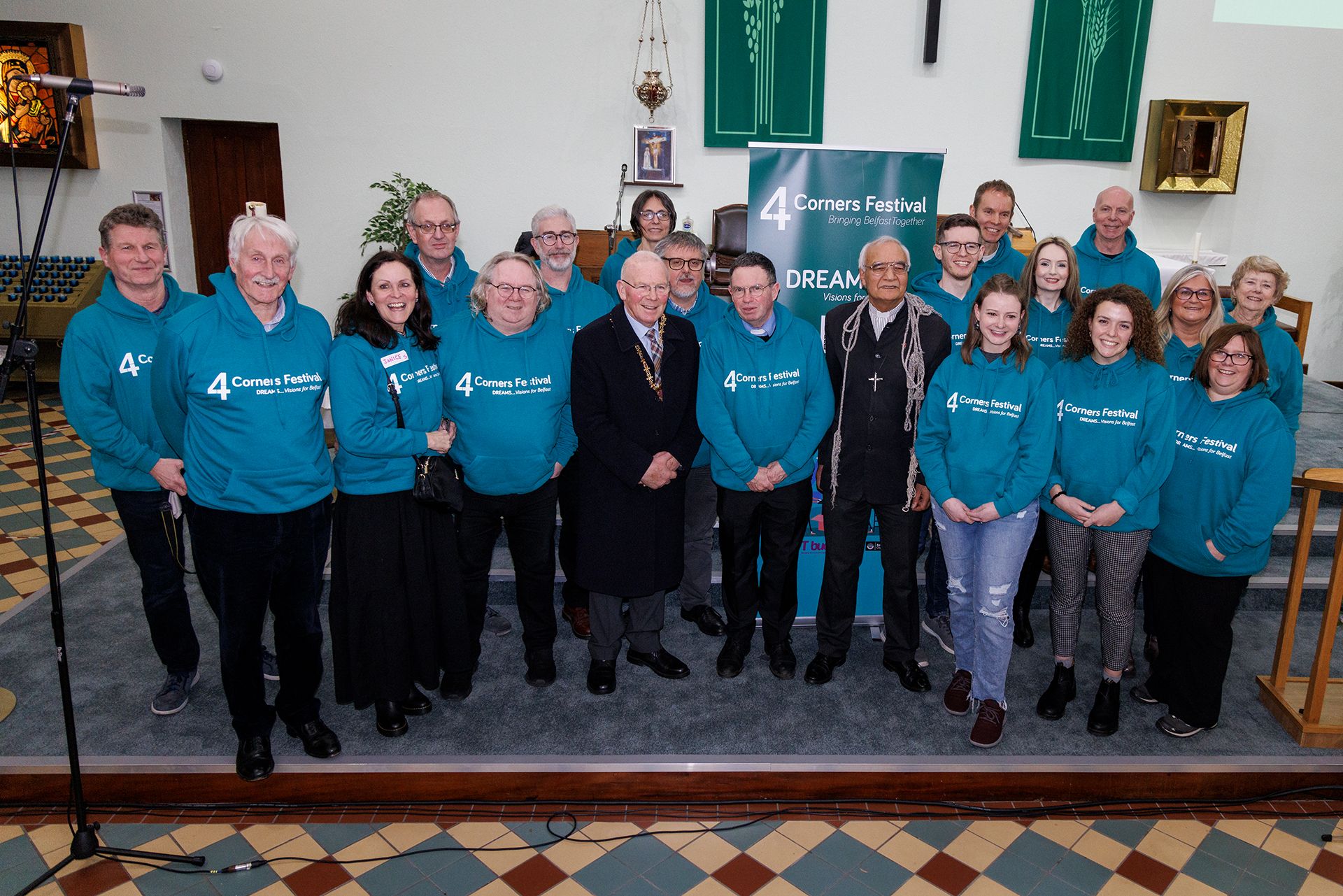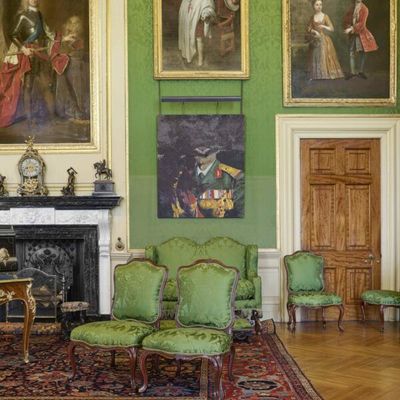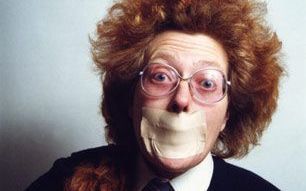At St John's Parish on the Falls Road for the final event in this year's Four Corners Festival, the gathering crowd was welcomed with a burst of small, warm lights at the bottom of each tree. The effort involved in installing them was worth it as the audience from around the city commented on them as they filed in.
I usually get to quite a few events but the dreaded flu had kept me away until this lecture. Rev Dr Inderjit Bhogal OBE was to speak on the city where dreams become a reality.
Founder and President of the City of Sanctuary Movement, a former President of the British Methodist Conference and leader of the Corrymeela Community, Inderjit was awarded an OBE for his endeavours for interfaith relations.
Delighted to be at the 4 Corners Festival this evening. Rev Inderjit Bhogal challenged and inspired us all with his vision of a City of Sanctuary.#4corners pic.twitter.com/4fXbROit2e
— john kyle (@cllrjohnkyle) February 5, 2023
"What does it mean to live in a city with open gates, where all nations are welcome and find healing in the leaves of its trees?" he asks. But before our special guest spoke, the visitors from St Mathew's on the Shankill Road got a thank you from Catherine McCoy, pastoral assistant, and a round of applause from everyone there for attending.
Concentio choir treated everyone to a number of musical interludes and there was an opportunity to hear from a few different voices before the main event.
Eliott and Tylier shared their experience of participating in the event with the Ulster University, getting some photography tips from Mal McCann beforehand.
Dr Victoria Grath from Los Angeles talked about her first visit ten years ago. Back then she"'could not believe her eyes that Christians were divided by walls". She returns from the States every year to attend the festival. Victoria grew up in the racially segregated city of Tulsa, Oklahoma where a race massacre took place in the 1920s. She believes Los Angeles could do with its own Four Corners Festival itself as the city is so divided.
Rev Neil Craigan from South Belfast, a BT9er who now has a congregation in Minneapolis said he would never have visited certain parts of the city growing up. As well as catching up with friends and family he says he is drawn to be at the festival. He has "a need to come".
"My prayer is not only for those attending tonight but for those who are reluctant to turn up."
He says the hopes and dreams of a better future; hearing each other and appreciating the churches coming together and putting aside their denominational differences and being one, just as Jesus commanded, is part of the appeal.
"People who come together and are vulnerable, they take a risk," he said. 'It's not just about listening but about really hearing each other." He explained that one of his ancestors was a member of the United Irishmen and sentenced to be hanged while on another side of his family, Rev William Homes of Ballyeaston formed the Ballyeaston Yeomanry to fight the rebels.
Two sides, one family.
Neil's grandfather was a great supporter of Home rule but his great-great grandfather stood on the platform with Carson on Ulster day in 1912 and preached the sermon that day. He told the unionist masses: "The Irish question is at bottom a war against Protestantism and an attempt to establish a Roman Catholic ascendancy in Ireland." Neil said he thinks his great-great grandfather was was wrong but the fear was real even if it was misplaced. He rounded up by saying he was present because his dad had sent lorries to Bombay street in August 1969 to help people evacuate those who had been burnt out by loyalists. Then finished by saying: "My prayer is not only for those attending tonight but for those who are reluctant to turn up."
Rev Dr Inderjit Bhogal spoke of his own family's exodus from four different countries, all because of British politics around the world. He cannot stay away from Ireland and loves the people and their stories.
He thinks that Indians and the Irish have a lot in common — same colours in their flags and the same attitude to timekeeping. He spoke of his real claim to fame being going to school with Lenny Henry, both of them leaving school with no qualifications. No one expected anything from them.
He spoke of the number of places of sanctuary in Ireland who have connected. He uses as his ministerial stoal a piece of rope that he took from a refugee boat and his work shines a light on the tragedy of making it so difficult for people to migrate. Why not work to make travel easier? he asks. Why not foster community and compassion.
He spoke of Father Des, a critic of church and state that spoke up for many. We were told that love the stranger is mentioned forty times in the bible and City for Sanctuary is partly an inspiration from those words.
Sanctuary or Tearmann is an ancient Celtic reality, he said, mentioning Nendrum and Glendalough.
Today there are 100 million people uprooted from their own countries looking to live elsewhere 90 per cent are from countries at war. The number of people seeking sanctuary 20 years ago in Britain was 100,0000, last year it was 45,000. He believes that migration is inevitable and policies should be in place to support the movement of peoples. We live in a world of hostility and hatred towards the other, towards the stranger,and we have failed to eradicate cruelty and create a world of compassion. But City of Sanctuary is a way forward, to challenge hostility with hospitality. The Irish history of immigration reminds us that the sea is a passageway. His final words were: "be human and call others back to their humanity, be hospitable always challenge other people to be hospitable and always challenge hatred and hostility and you do this when you challenge inhumanity and inhospitality, this will build hope."
While the formal part of the evening finished with a hymn, I thought about the amount of Protestants who were there, as everyone was singing. Tea and buns finished the evening and as I chatted to some of the audience I thought about how much the festival has matured in the eleven years since it started. While we can look forward to a time when such a festival will not be needed, we are still a few years away from that day.
A Farther Shore, the one person play by Rev David A Campton, developed for the festival, will have another run at The Sanctuary Theatre, Castlereagh street 15-18 February. Tickets available online.
That’s a wrap another successful @4cornersbelfast finale with Indergit Bhogal CIty of Santury a warm welcome to Westbelfast from @MartinJMagill parish #Belfast pic.twitter.com/7HyBC7Rh1F
— Bronagh Lawson (@CreativChangeNI) February 5, 2023
Starting this week the NI science festival has everything from sparking your interest as a blacksmith to creating your own platform game from scratch. 16- 26 February. North Belfast Festival runs 24-26 February you are too late for get tickets for writer Anna Burns' talk but there are lots of great writing events to catch as well as tours and visual arts.






